Contents
Market Overview
Macro Review
Markets continue to navigate paradigm changes and concerns about policy credibility. The European Central Bank (ECB) hiked interest rates by 75bp, bringing the main refinancing rate to 2% from 0% just three months ago. Amid record high inflation driven by high energy prices, this marks the most aggressive tightening cycle in the history of the monetary union as it took the ECB 18 months or more to increase rates by 200bps during its two previous hiking cycles. However, the ECB seems to still be trying to walk a fine line and not send overly hawkish forward guidance signals against the backdrop of the war in Europe and a recession that appears unavoidable. Meanwhile, speculations that the Fed might be mulling a potential pivot toward slowing the pace of tightening in 2023 drove UST yields lower and pushed the DXY index to a three week low, although some reversal took place on Friday. Against that backdrop and a sharp drop in European natural gas prices to below €100/MWh for the first time since mid-June, global equities advanced and the EUR/USD briefly moved above parity for the first time since mid-September. In the UK, former Chancellor Rishi Sunak was confirmed as the new Prime Minister, becoming the third one this year. Despite signals that UK’s medium-term budget will be delayed to November 17 from October 31, the pound strengthened. In one of his longest public appearances since the war in Ukraine broke out, Russian President Putin delivered a speech at the annual meeting of the “Valdai Discussion Club” in Moscow. Putin warned that humanity is facing “the most dangerous, unpredictable and, at the same time, important decade since the end of World War II” and that the West would have to talk to Russia and other major powers about the future of the world.
EM Credit Update
Emerging market sovereign credit (cash bonds) ended the week 3.2% higher with spreads 24bp tighter. EM corporate credit was 0.6% higher with spreads 16bps wider. Sovereign outperformers over the week were Angola, Egypt and Ecuador while Sri Lanka, Ghana and Papua New Guinea underperformed.
The Week Ahead
A busy week ahead filled with central bank meetings across DM and EM. Consensus expects that the Fed’s FOMC meeting will produce a 75bp rate hike given that YoY core inflation continues to trend higher. The Bank of England (BoE) appears likely to deliver a hike of the same magnitude as the Fed, although a less hawkish 50bp move also seems to be on the table given recent political/policy pivot by the government. The Reserve Bank of Australia (RBA) appears likely to go back to larger rate hikes, moving away from its earlier brief more dovish tilt. Across Asia, PMI reports will be scrutinized by markets for signals on diverging growth outlooks. In EMEA, CPI inflation data in Turkey and Poland is likely to confirm that inflation remains on an upward trajectory in those economies.
Highlights from emerging markets discussed below include: Egypt secures staff-level agreement on a new IMF program; and South Africa Medium-Term Budget Policy Statement (MTBPS) points to strong near-term performance with ambitious debt path.
Fixed Income
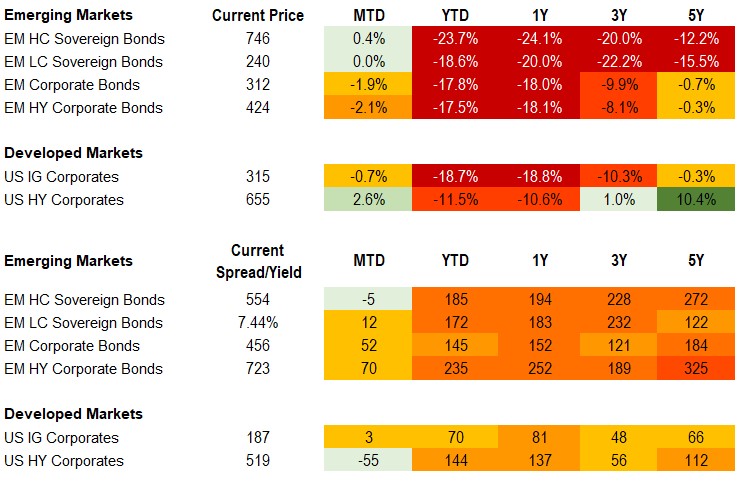
Equities
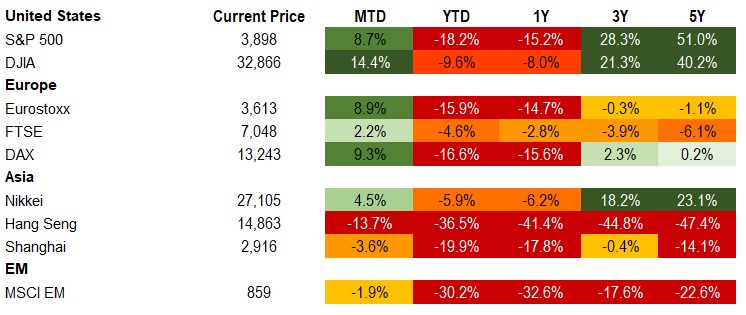
Commodities

Source for data tables: Bloomberg, JPMorgan, Gramercy. EM Fixed Income is represented by the following JPMorgan Indicies: EMBI Global, GBI-EM Global Diversified, CEMBI Broad Diversified and CEMBI Broad High Yield. DM Fixed Income is represented by the JPMorgan JULI Total Return Index and Domestic High Yield Index. Fixed Income, Equity and Commodity data is as of October 28, 2022 (mid-afternoon).
Emerging Markets Weekly Highlights
Egypt secures staff-level agreement on a new IMF program
Event: The government and IMF reached a staff-level agreement on a 46-month, $3bn Exchange Fund Facility (EFF) arrangement following a moderate 15% devaluation, 200bps rate hike, and commitment to a flexible exchange rate regime going forward. The deal also includes $5bn of bilateral support from international and regional partners as well as $1bn in additional IMF financing from the Resilience and Sustainability Trust (RST). The EFF program aims to provide Egypt with balance of payments and budget support while catalyzing additional bilateral financing. The IMF Executive Board is expected to discuss the request for approval in December.
Gramercy commentary: The announcement was well-telegraphed during the annual meetings in D.C. earlier this month and largely anticipated by the markets. While the overall size of the deal is somewhat underwhelming relative to redemptions to the Fund and external financing needs over the medium-term, the renewed policy anchor and near-term external funding relief is constructive for the credit. The continued focus on fiscal consolidation and structural reform to spur private sector growth is welcomed, although it will not be without its challenges. Greater EGP flexibility following the devaluation and removal of import restrictions, combined with continued prudent monetary policy, should gradually improve competitiveness, and reduce imbalances over the medium-term.
South Africa Medium-Term Budget Policy Statement (MTBPS) points to strong near-term performance with ambitious debt path
Event: The MTBPS outlined stronger than originally budgeted fiscal performance for FY 22/23 with the deficit reduced to 4.9% of GDP from 6.0% of GDP led by revenue overruns. The update now assumes further consolidation in FY 23/24 to 4.1% of GDP from 4.8% of GDP set in the February budget and debt stabilizing this year at 71.4% of GDP. Minister Godongwana stated that the instruments and method of addressing Eskom’s debt relief is still to be determined, but the size is expected to be between one and two thirds of Eskom’s debt.
Gramercy commentary: This fiscal year’s revenue outperformance and the consolidation envisaged over the forecast horizon exceeded market expectations. Fiscal prudence, whereby revenue overruns are not being put forward to cover permanent expenditure increases, is constructive. However, risks to achieve the consolidation and debt stabilization path outlined remain elevated. Upside expenditure pressure from wages, Eskom, and the potential extension of the basic income grant amid more uncertain terms of trade outlook, may result in higher and later debt stabilization than currently outlined by authorities. While we see the government’s recommitment to further backstop Eskom debt along with likely climate related finance flows as incrementally constructive for the SOE, details remain limited. The specifics of the debt transfer and potential buyback will be in focus for the 2023 budget presentation in February.
Emerging Markets Technicals
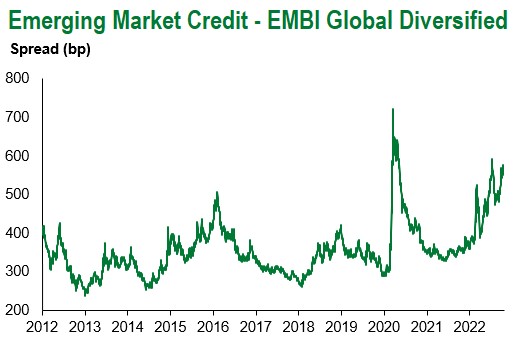
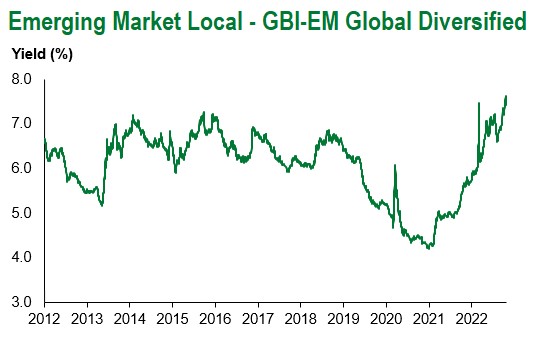
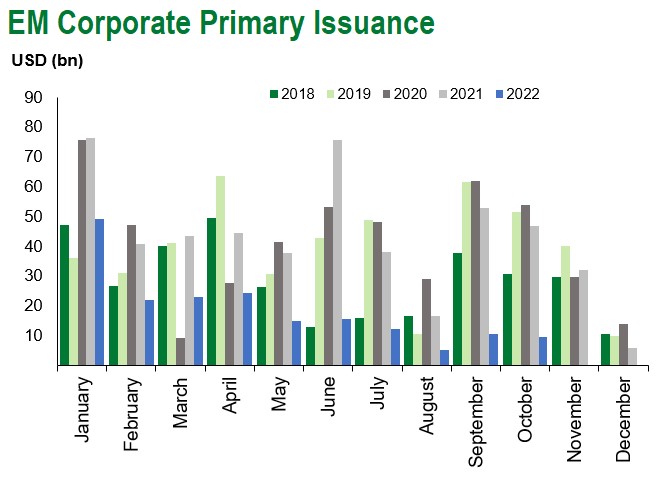
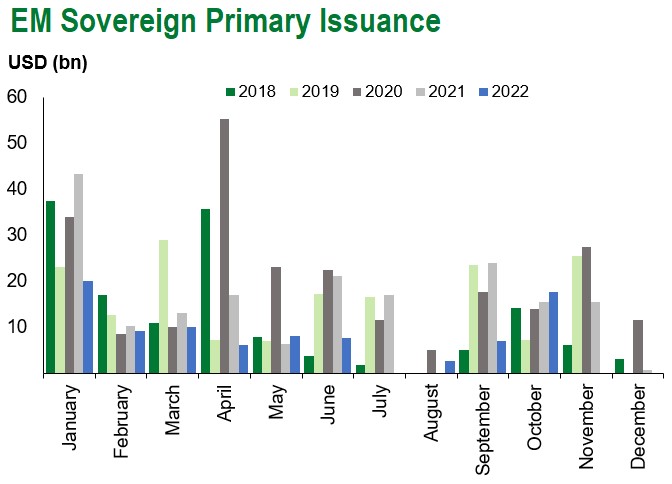
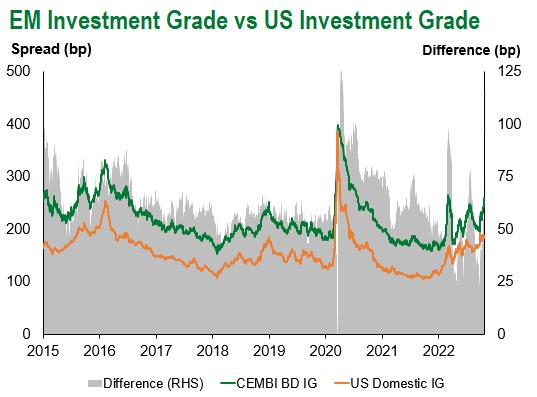
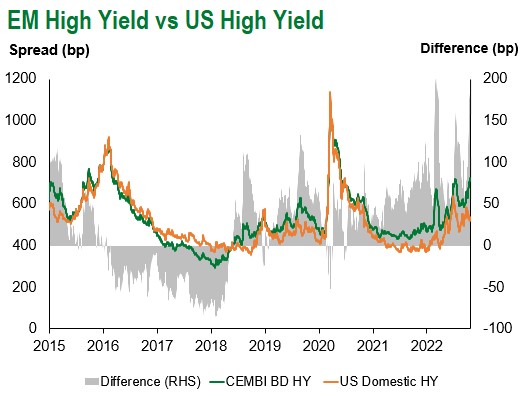
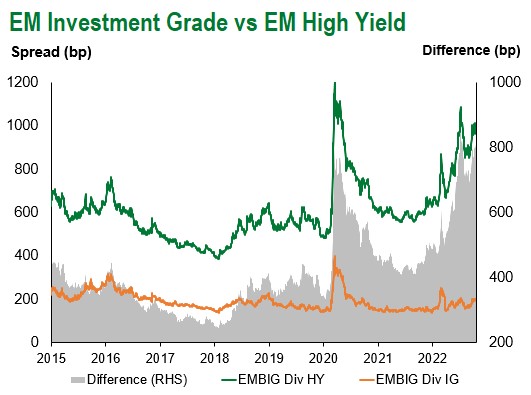
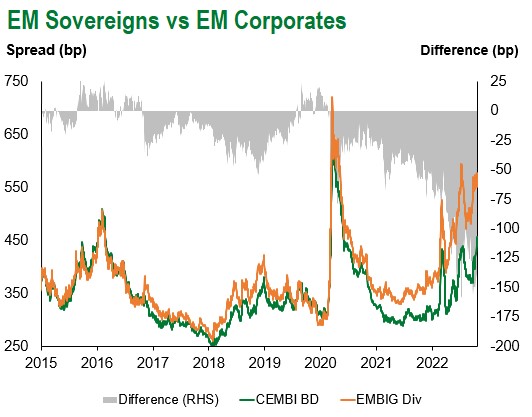
Emerging Markets Flows
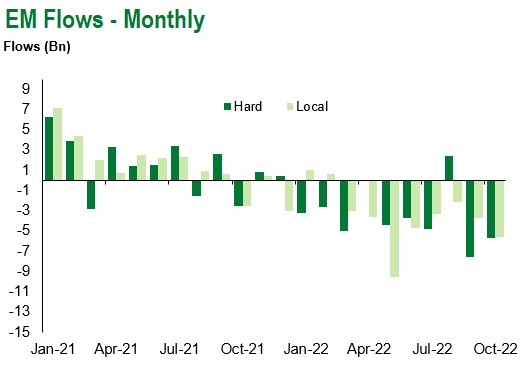
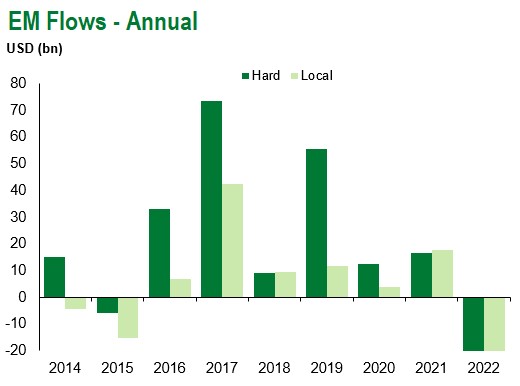
Source for graphs: Bloomberg, JPMorgan, Gramercy. As of October 28, 2022.
COVID Resources:
Johns Hopkins COVID-19 Case Tracker
For questions, please contact:
Kathryn Exum, CFA ESG, Director, Co-Head of Sovereign Research, [email protected]
Petar Atanasov, Director, Co-Head of Sovereign Research, [email protected]
James Barry, Director, Deputy Portfolio Manager, [email protected]
This document is for informational purposes only. The information presented is not intended to be relied upon as a forecast, research or investment advice, and is not a recommendation, offer or solicitation to buy or sell any securities or to adopt any investment strategy. Gramercy may have current investment positions in the securities or sovereigns mentioned above. The information and opinions contained in this paper are as of the date of initial publication, derived from proprietary and nonproprietary sources deemed by Gramercy to be reliable, are not necessarily all-inclusive and are not guaranteed as to accuracy. This paper may contain “forward-looking” information that is not purely historical in nature. Such information may include, among other things, projections and forecasts. There is no guarantee that any forecasts made will come to pass. Reliance upon information in this paper is at the sole discretion of the reader. You should not rely on this presentation as the basis upon which to make an investment decision. Investment involves risk. There can be no assurance that investment objectives will be achieved. Investors must be prepared to bear the risk of a total loss of their investment. These risks are often heightened for investments in emerging/developing markets or smaller capital markets. International investing involves risks, including risks related to foreign currency, limited liquidity, less government regulation, and the possibility of substantial volatility due to adverse political, economic or other developments. References to any indices are for informational and general comparative purposes only. The performance data of various indices mentioned in this update are updated and released on a periodic basis before finalization. The performance data of various indices presented herein was current as of the date of the presentation. Please refer to data returns of the separate indices if you desire additional or updated information. Indices are unmanaged, and their performance results do not reflect the impact of fees, expenses, or taxes that may be incurred through an investment with Gramercy. Returns for indices assume dividend reinvestment. An investment cannot be made directly in an index. Accordingly, comparing results shown to those of such indices may be of limited use. The information provided herein is neither tax nor legal advice. Investors should speak to their tax professional for specific information regarding their tax situation.
